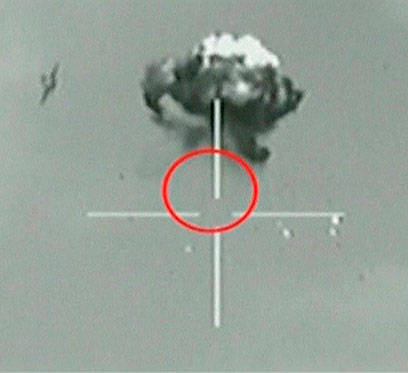The media has not paid attention to credible political attacks on Hezbollah by Sunni elements in Lebanon. Questions are being asked about Hezbollah’s military force and whether the group is more loyal to outside entities than it is to Lebanon.
By Yoav Limor
The conventional wisdom in the Israeli defense establishment on Thursday night was that Hezbollah’s launch of a drone into Israel earlier in the day was a sign of the group’s distress. Hezbollah has been facing growing criticism for its military involvement in the Syrian civil war and the drone launch was meant to divert attention from that and serve as a reminder to those who have forgotten that Hezbollah is “Lebanon’s shield.”

Downing of drone that entered Israeli airspace in October – Screenshot of IDF video clip
In recent weeks, Lebanon’s internal affairs have gone under the radar of the Israeli media. The media has not paid attention to credible reports of pro-Assad military activities by Hezbollah in Syria and consequent political attacks on Hezbollah by Sunni elements in Lebanon. Questions are being asked in Lebanon about Hezbollah’s military force and whether the group is more loyal to outside entities (i.e. Syria and Iran) than it is to Lebanon.
In Israel’s eyes, Hezbollah’s involvement in Syria has both positive and negative aspects. On the positive side, the presence of hundreds of Hezbollah fighters in Syria ensures quiet on the Israel-Lebanon border in the short-term, as Hezbollah does not have the will or capability to fight on multiple fronts at the same time. On the negative side, in the long run, Hezbollah’s close relationship with the Assad regime and the group’s physical involvement in the fighting in Syria means that it will have access to advanced weaponry (including chemical weapons, anti-aircraft and anti-ship missiles) the day after Assad falls.
Another component to Thursday’s drone launch was the obvious public relations angle. It can be assumed the drone that was shot down 10 kilometers (six miles) west of Haifa was meant to take pictures over Israel and transmit them back to Lebanon (or return with them to Lebanon). Hezbollah leader Hassan Nasrallah probably planned to use these pictures to embarrass Israel and create a new equation: You, the Israelis, penetrate our airspace, and we, Hezbollah, penetrate yours. Just like we are defenseless against you, you are defenseless against us.
This is how Hezbollah intended to act following the previous drone incident last October, when a drone launched from Lebanon flew above Israel for a number of minutes before being shot down over the Negev Desert. At the time, Nasrallah lied and claimed achievements that had not taken place, but Israel understood that Hezbollah had identified a relatively soft spot and would likely bolster its drone program and launch them with greater frequency.
As always, Iran is responsible for this effort. For several years now, Iranian engineers have been developing various sorts of drones and have recently made impressive progress, partly due to their study of crashed American drones. The West is less concerned about the photographic capabilities of Iranian drones than it is about the possibility they will be armed with explosives and sent on suicide missions at strategic targets.
After October’s drone incident, several steps were taken to prevent future Hezbollah successes. These included the positioning of advanced, and particularly sensitive, radar systems in the north, as well as the strengthening of intelligence and operational efforts to thwart attempts to breach Israel’s airspace. These measures proved themselves on Thursday.
In the meantime, Israel believes Hezbollah wants to avoid opening a new front and will be satisfied with the PR achievement it made Thursday. This trend will probably get stronger as the noose tightens around Assad’s neck. The U.S. government’s stuttered (and belated) admission on Thursday that Assad has used chemical weapons against rebels will likely increase pressure on Assad and his supporters, including Iran and Hezbollah. For Israel, the meaning of this is clear. As pressure increases on the other side of the northern border, Israel automatically must elevate its vigilance and state of readiness.
View original Israel Hayom publication at: http://www.israelhayom.com/site/newsletter_opinion.php?id=4121






 Israeli New Shekel Exchange Rate
Israeli New Shekel Exchange Rate